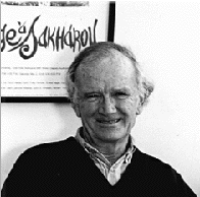 |
| Source: Princeton.edu |
Topics: Nobel Prize, Particle Physics, Passage, K-meson, Symmetry
I mourn again the loss of another Nobel Laureate, one week from Dr. Townes. As elders inevitably leave the planet, they will be replaced, obviously. The impressive achievements of giants like Townes and Fitch is they did it before an Internet; search engines or laptops. They did their work most likely with primitive mainframes, logarithm tables, CRC handbooks and slide rules. There's a certain romanticism to that.
I really don't know if this is recent info, but I found this description from his Professor Emeritus page at Princeton quite intriguing:
Most recently I have been pursuing the question of the existence of the H particle ("H" for hexaquark). This particle was first proposed by Robert Jaffe who noted that the special symmetry of two u, two d, and two s quarks should lead to a stable particle (stable with respect to the strong interactions) with the quark content of two lambdas. He estimated that the mass should be about 80 MeV below the sum of the masses of two lambda particles. Subsequent calculations using a wide variety of models have given mass estimates ranging from values less than the deuteron to unbound states. The existence of the H remains an experimental question. The driving interest in the particle lies in its being a new state of matter (six quarks in one bag). In addition, if the mass is near the deuteron, it could have a lifetime sufficiently long to have cosmological significance.
From NobelPrize.org:
A Small but Clear Lack of Symmetry
For a long time, physicists assumed that different types of symmetries characterise nature. In a kind of mirror-world the physical laws should be the same if right and left are exchanged and if matter is replaced by antimatter. The left-right symmetry had already been shown to be violated when Val Fitch and James Cronin in 1964 discovered that in the decay of the neutral K-meson the matter-antimatter symmetry is also violated. They could also show that symmetry under time-reversal is not valid: reactions going backward in time are not identical to those going forward.
Nobel Prize in Physics 1980:
James Watson Cronin (student), Val Logsdon Fitch (professor)
News at Princeton:
Nobel Laureate and Princeton physicist Val Fitch dies at age 91
Catherine Zandonella
Comments